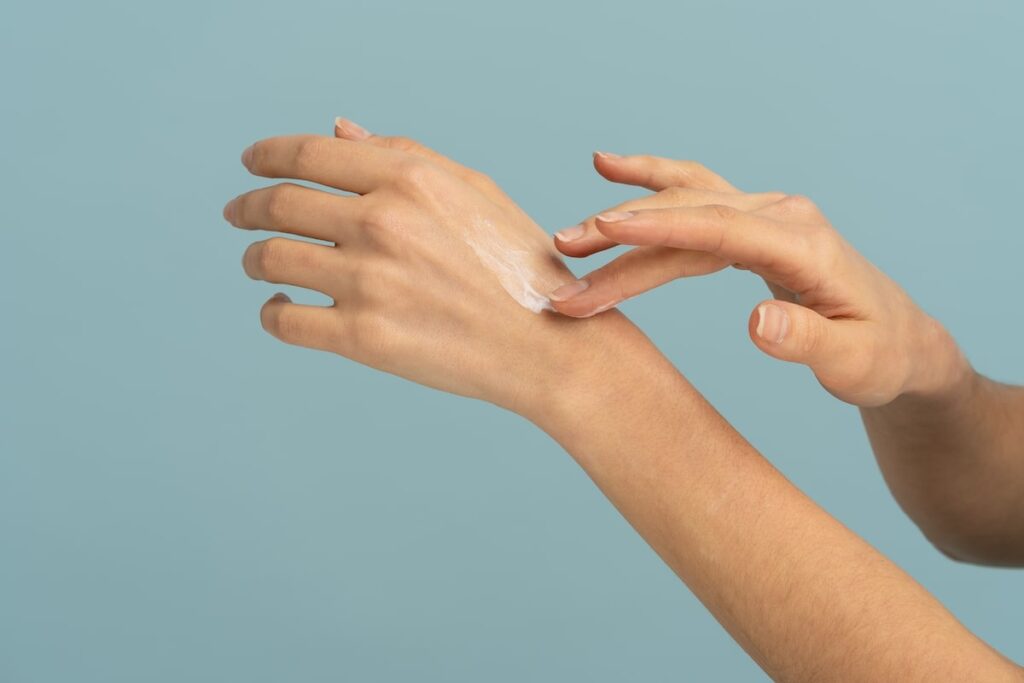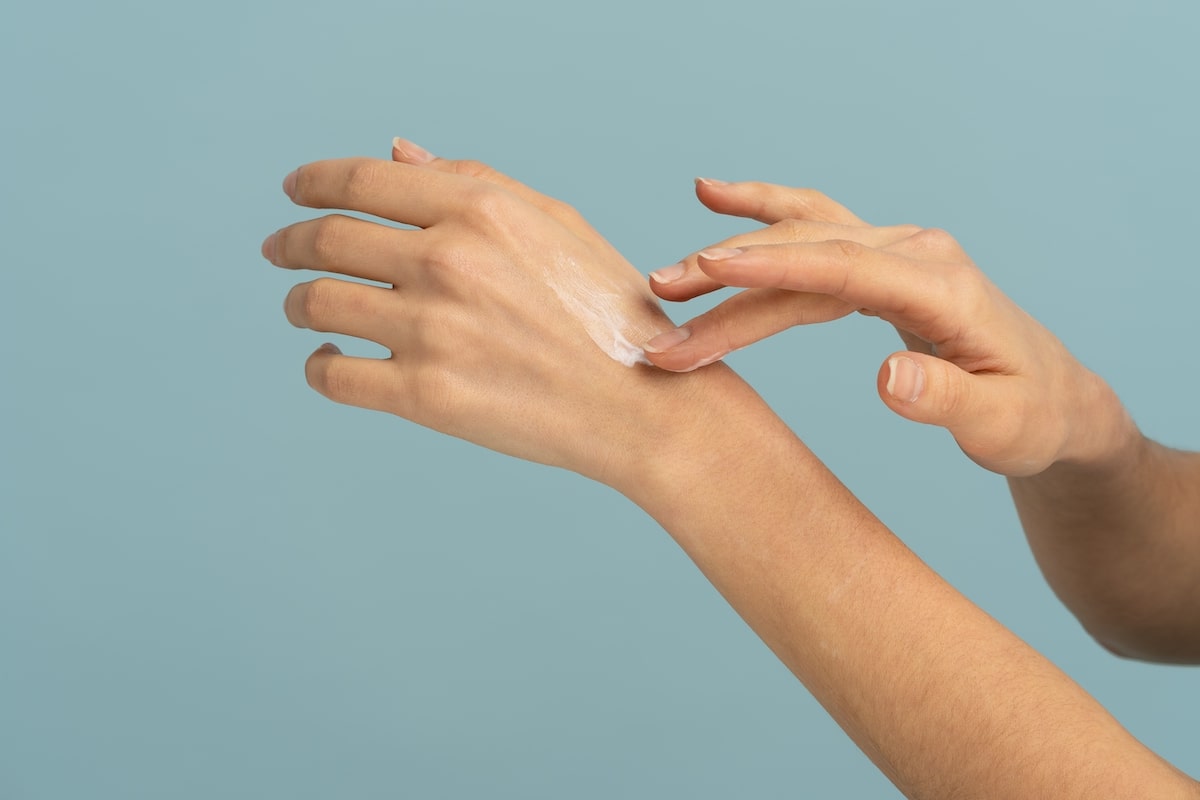No products in the cart.
Best cream choices, Blog, cream, high content water, moisturizer vs lotion, Moisturizers, moisturizers and lotions, Oily Skin, Skin Care Products, skin protection, skin types, skincare, skincare routine, skincare tips, Sun Protection, sunscreen spf, textures of moisturizers and lotions, Treatment
Confused Between Moisturizer And Lotion? Learn The Differences And Choose The Right One For Your Skin
Starting a skincare routine can sometimes feel like trying to solve a puzzle, especially with so many products all promising to give you great skin. Two items you’ll often hear a lot about are moisturizers and lotions.
Even though many people use these names as if they mean the same thing, they’re actually quite different. Whether you’re new to skincare or looking to get more out of your routine, it’s important to know what sets moisturizers and lotions apart. They have different ingredients, feel different on your skin, and do different things to help keep your skin hydrated.
We’re here to make these differences clearer, helping you choose the right one based on what your skin needs. This way, you can take a big step toward getting your skin to look and feel its best.
 The Composition — What’s Inside Counts
The Composition — What’s Inside Counts
The primary distinction between lotion and moisturizer lies in their respective compositions.
Lotion
Lotions, typically lighter and more fluid, are a mix of water and oils, with water being the predominant component. This makes them excellent for providing light hydration, perfect for normal to slightly dry skin types
Think of lotion as your skin’s quick sip of water. Typically, lotions have a higher water content, making them light and fast-absorbing. They’re perfect for normal to slightly dry skin, looking for quick-fix hydration without the heaviness.
Ideal for daily use, lotions keep the skin moisturized and happy, especially in warmer climates where heavier creams could feel too much.
Moisturizer
Moisturizers, on the other hand, have a thicker, creamier consistency due to a higher concentration of oils. They are designed to create a barrier on the skin’s surface, effectively locking in moisture. This makes moisturizers particularly beneficial for dry to extremely dry skin types, which require more intensive hydration.
The term “moisturizer” is a broad one, encompassing products designed to hydrate and lock in moisture. This category can include anything from lighter lotions to thicker creams. They work by either drawing moisture into the skin, preventing moisture loss, or doing a bit of both. For those facing dry skin, a more durable moisturizer can be a game-changer, truly nourishing the skin and defending it against the harsh trials of daily life.
Cream
On the thicker side, creams are the heavyweights against dry skin. They often boast oils in addition to water, creating a protective layer that ensures hydration doesn’t just evaporate into thin air. Perfect for dry to very dry skin, they can feel too rich for those with oily skin types.
Understanding your skin type is crucial. Whether it leans more on the oily side, stubbornly stays dry, or comfortably settles in the normal range dictates which product—lotion, cream, or a middle-ground moisturizer—is your skin’s best ally.
Now, with the basics in your arsenal, you’re better equipped to gain extensive knowledge of the world of skincare, making informed choices to keep your skin radiant and healthy.
The Textures And Method Of Application
Let’s talk about texture, one of the key differentiators that come into play when deciding between a moisturizer and lotion. The whole ‘moisturizer vs lotion ‘ battle really boils down to their texture and how they ‘feel’ on the skin.
Lotion
A lotion isn’t just water; it’s water meets oil. This combination creates a fluid, lightweight formula, perfect for those who crave hydration without the heavy-duty feel.
- Lotions spread like a dream, easily covering large areas of the body without leaving a greasy residue.
- They absorb rather quickly into the skin, perfect for those rushed mornings when time isn’t on your side.
- If your skin leans on the normal or slightly dry scale, you’ll appreciate a lotion’s subtle, non-sticky moisturization.
- They’re a great choice for summer months or daytime use when you want to keep your skin feeling free and unclogged.
Moisturizer
This term covers a broad spectrum, from light lotions to rich creams. However, when distinguishing a moisturizer vs lotion, we often refer to the former as a thicker, more substantial formula meant for intense hydration.
- Moisturizers are typically thicker in consistency than lotions, taking a bit longer to absorb but delivering an unrivaled moisture-lock experience.
- People with dry skin or those bracing harsh winter months will benefit from this hydration heavyweight shielding their skin from dryness and discomfort.
- If “moisturizing 101” had a cardinal rule, it would be the drier the skin, the thicker your product. So, for skin that screams for relief during the dry winter months, creams might just be your skin savior.
- While lotions are usually ideal for large areas of the body, moisturizers, and creams often cater better to facial skin or specific problematic areas dealing with severe dryness.
Getting to know the difference between a lotion and a moisturizer keeps everyone on their toes. Armed with this knowledge of texture and application, you’re one step closer to uncovering the secret to radiant skin and smarter decisions tailored to your skincare needs. Still confused about which one should you use? Well, keep reading to learn more.
The Ingredients In Moisturizers And Lotions
Peeling back the label on your skincare favorites reveals a world of ingredients designed to hydrate, protect, and rejuvenate your skin. When it comes to moisturizer vs lotion, the composition is where the magic happens.
Lotion Ingredients:
- Higher water content: This makes lotions lighter and more readily absorbed into the skin, perfect for quick hydration boosts.
- Humectants: Substances such as glycerin and hyaluronic acid are heroes in lotions. They pull water from the air into the skin, ensuring that your skin remains hydrated throughout the day without feeling heavy or greasy.
- Lotions are the go-to for those wanting to keep their skin hydrated without the risk of clogging pores, especially beneficial for normal to slightly dry skin types seeking a non-invasive moisturize solution.
Moisturizer Ingredients:
- Higher oil content: Moisturizers pack a heavier punch when it comes to oil-based ingredients. This is key for creating a barrier that hydrates the skin by locking in moisture, reducing the chance of it evaporating.
- Emollients and Occlusives: These are stars in the moisturizer show. Emollients (like shea butter) smooth out the skin by filling in the gaps, while occlusives (such as petroleum jelly) form a protective seal over the skin to prevent moisture loss. This duo is indispensable for combatting dry skin.
- Moisturizers are the ideal choice for those facing drier skin challenges or when battling the dehydrating effects of colder climates. They ensure your skin stays moisturized, promoting a supple texture and protecting against environmental stressors.
Understanding the ingredients is crucial to selecting the right product for your skin type and needs. Whether it’s a lighter, hydrating lotion for everyday use or a richer, more nourishing moisturizer for targeted care, the right blend of ingredients can make all the difference in achieving balanced, healthy skin.
 Choosing The Right One For Your Skin Type
Choosing The Right One For Your Skin Type
When selecting between a lotion and a moisturizer isn’t just about preference; it’s about understanding what your skin craves. Here’s a straightforward guide to help you choose wisely according to your skin type:
1. Normal Skin
Lucky you! Both lotions and moisturizers can keep your skin balanced. A light lotion is perfect for everyday hydration, while a creamier moisturizer can offer extra nourishment as needed, especially in dry winter months.
2. Dry Skin
Moisturizers are your best friend, thanks to their intense hydration capabilities. Their higher oil content is ideal for locking in moisture, combating dry patches, and keeping your skin supple.
3. Oily Skin
Look for non-comedogenic, water-based lotions, like an anti aging cream for oily skin, designed to hydrate without clogging pores. These lotions help maintain natural moisture without adding excess oil, perfect for managing that oil and water balance.
4. Sensitive Skin
Your skin requires gentle care. Opt for fragrance-free lotions or moisturizers specially formulated for sensitivity. These products can help moisturize and soothe without causing irritation.
5. Combination Skin
It might take some personal experimentation to get it just right. Using lotions on the oilier parts of your face and moisturizers on the drier areas can offer balanced hydration without overdoing it.
The choice between lotion and moisturizer isn’t about right or wrong; it’s about understanding your skin’s needs and the benefits each product offers. By considering your skin type, the climate you live in, and your preferences in texture and application, you can find the perfect hydration partner for your skincare routine.
Experiment by applying small amounts and monitoring your skin’s response. The correct balance of hydration and nourishment is crucial for optimal skin health.
Remember, your skin’s needs can change with seasons, age, and environmental factors, so be open to adjusting your choice accordingly.
Hydrated, happy skin is a hallmark of health and vitality – choose wisely to support it in the best way possible.










